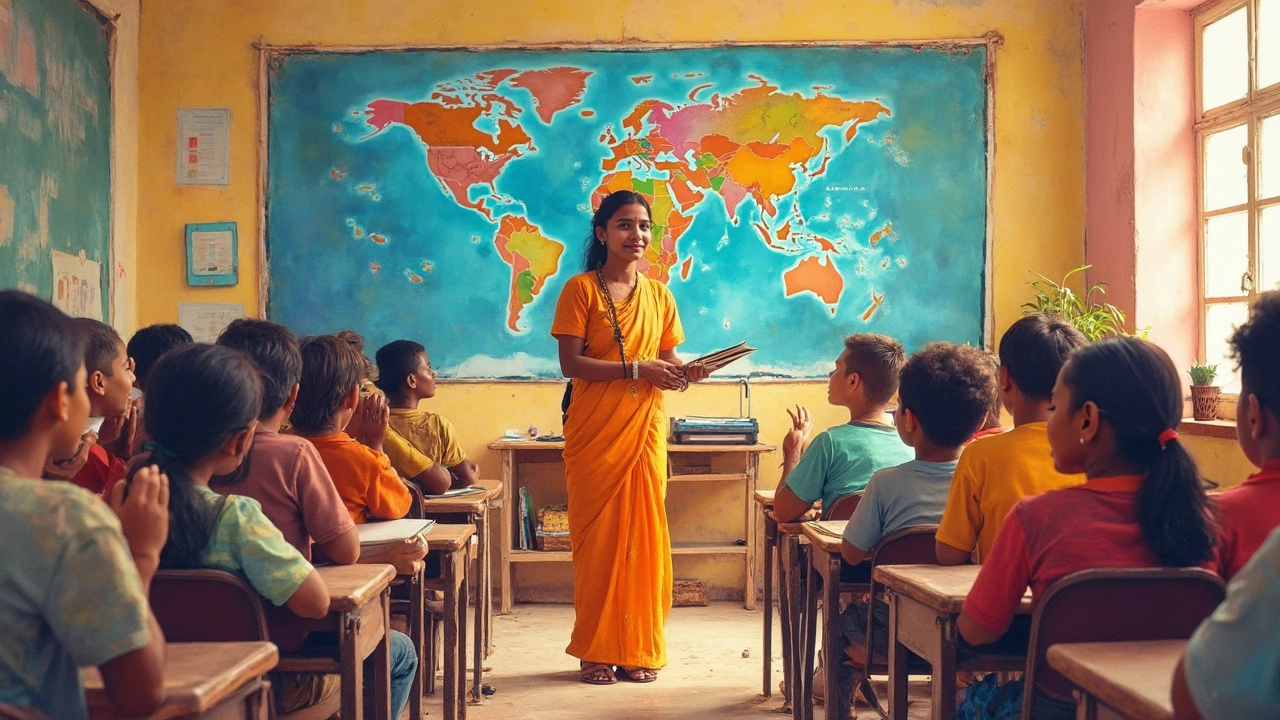
Thinking about CBSE instantly brings India to mind, right? While it’s true that the Central Board of Secondary Education (CBSE) is indeed an educational powerhouse rooted in India, its reach stretches far beyond the country's borders. Surprised? Many are.
CBSE isn't just limited to Indian soil; its curriculum is taught around the world. From the Middle East to Southeast Asia, wherever there’s a dense Indian expatriate population or an interest in a well-rounded, rigorous curriculum, you'll likely find a CBSE-affiliated school. It's like India’s educational export, shaping young minds globally.
Why do schools overseas choose CBSE? For one, it's consistent. Parents moving across borders can rest easy knowing their children's education won't skip a beat. Plus, universities internationally recognize CBSE’s rigorous academic structure, which speaks volumes about its credibility.
- Understanding CBSE's Core
- CBSE's Presence Outside India
- Global Acceptance and Recognition of CBSE
- Challenges Faced by CBSE Abroad
- Future of CBSE on a Global Scale
Understanding CBSE's Core
The Central Board of Secondary Education, or CBSE, is often hailed as one of India's premier educational boards due to its structured approach and wide acceptance. Established in 1962, CBSE's main aim was to provide a common, standardized education system across the whole nation, ensuring quality and consistency.
CBSE is affiliated with over 24,000 schools in India and more than 240 schools worldwide. That's no small feat! Its curriculum, which changes and evolves to meet contemporary education needs, focuses on holistic development, combining academic rigor with co-curricular activities.
Key Features
Let's touch on what makes CBSE special:
- Pupil-Centric Approach: CBSE emphasizes understanding concepts over rote learning. It's more about grasping the 'why' and 'how' than just memorizing textbooks.
- Continuous Evaluation: Moving away from just one-off board exams, CBSE introduced the CCE (Continuous and Comprehensive Evaluation) to keep a running check on students' performance throughout the year.
- Flexibility in Subjects: While science and maths are strongholds, CBSE offers a plethora of subjects, allowing students to explore varied interests, including arts and humanities.
CBSE's Adaptability
One of the fantastic things about CBSE is its adaptability to various cultural and linguistic settings. While English is the medium of instruction, regional languages are also supported, ensuring inclusivity.
Not to mention, the textbooks, crafted by NCERT, are known for their relevance and quality content. Kids aren't just learning from text; the content sparks curiosity and promotes critical thinking.
Why Does it Matter?
For parents and students alike, CBSE's structured yet flexible design offers an edge. Universities globally recognize its curriculum, and the board's reputation accompanies graduates everywhere they go. Overall, CBSE's core is about providing an education that's both comprehensive and adaptable, making it a go-to choice for many.
CBSE's Presence Outside India
Let's dive into how the CBSE isn't just schooling kids in India but taking on the world. Surprising? Not really. With a rapidly growing Indian diaspora, it makes perfect sense.
Globally, you'll find nearly 250 CBSE-affiliated schools scattered across various countries. That's a nod to its far-reaching influence. From the UAE to Singapore and Nepal, many nations host these schools, offering the same robust CBSE curriculum that's known in India.
Diverse Locations
The United Arab Emirates is a hotspot with over 75 schools following the CBSE curriculum. It's like a home away from home for Indian expats. Other Middle Eastern countries such as Qatar and Oman also embrace CBSE's presence with multiple schools.
In Southeast Asia, Singapore and Malaysia have CBSE schools, ensuring that students don’t miss out on the opportunities the curriculum offers. Even in closer neighbors like Nepal and Bangladesh, CBSE is well-represented.
Why These Countries?
So, why do these countries have CBSE? One major reason is the significant Indian population living overseas. They want their kids to have an education that seamlessly aligns with Indian standards because families often return to India after a few years. Moreover, CBSE’s focus on holistic education makes it appealing even to non-Indian citizens.
| Country | Number of CBSE Schools |
|---|---|
| UAE | Over 75 |
| Qatar | 10+ |
| Singapore | 5+ |
Another reason is that CBSE is renowned for preparing students for global competitive exams. The curriculum is designed to be future-ready, making students adaptable to different academic systems worldwide.
So next time you think CBSE's just an Indian thing, remember it's got its fingerprints across the globe, shaping young minds and proudly flying the Indian education flag.

Global Acceptance and Recognition of CBSE
The CBSE board isn't just a big deal in India; it has carved a niche for itself on the global stage too. But how did this curriculum become so widely accepted and recognized?
First off, CBSE’s emphasis on a standardized syllabus ensures that every student, regardless of where they're studying, gets the same level of quality education. This makes transitioning between international schools seamless for students.
Consistent Approach and Quality
When schools in different countries choose CBSE, they’re opting for a curriculum that promotes consistent evaluation methods and focuses on critical thinking. This ethos of consistency reassures universities worldwide about the preparedness and competence of CBSE graduates. Many top universities accept CBSE results for admissions, particularly in countries where the Indian diaspora is significant.
Global Footprint
Did you know that there are over 200 CBSE schools scattered across various countries? Places like the UAE, Singapore, and even some European nations host CBSE-affiliated schools. They provide an opportunity for students to access an Indian education while residing abroad.
Check out this table showing the number of CBSE schools in different regions:
| Region | Number of CBSE Schools |
|---|---|
| United Arab Emirates | 80+ |
| Singapore | 10+ |
| Europe | 5+ |
It’s fascinating how CBSE has managed to adapt to diverse educational landscapes while maintaining its core values.
Adapting to Local Needs
Adapting so well to international standards is no small feat. CBSE has tailored elements of its syllabus to meet local requirements without losing its integrity. This adaptability is a huge plus point for parents and students alike, allowing for an educational experience that’s both globally recognized and locally relevant.
So, if you're living abroad and considering CBSE for your child's education, you're not just sticking with an Indian standard; you're embracing a globally acknowledged system that opens up myriad opportunities.
Challenges Faced by CBSE Abroad
Even though the CBSE curriculum has carved out a niche worldwide, it's not without its share of hurdles. These challenges stem from fitting a distinctly Indian educational framework into diverse international settings.
Adapting to Local Requirements
One major obstacle is tailoring the CBSE curriculum to meet local educational laws and standards. Different countries have varying graduation requirements and subjects that might not align perfectly with CBSE's offerings. Schools often juggle between maintaining CBSE's integrity while adapting to comply with host country's educational norms.
Additionally, teaching methods and cultural values can differ significantly from those in India, sometimes causing a mismatch in how subjects are perceived and taught abroad.
Resource and Teacher Training
Finding well-trained teachers familiar with the CBSE curriculum poses another significant challenge. While some educators seamlessly transition into the system, others find it difficult to deliver the international academic expectations inherent with CBSE across different geographic landscapes.
As Rajesh Bhatia, an education consultant, once said, "To truly make an impact, CBSE must not just export an educational framework; it must also adapt to the local educational environment to really connect with students.”
Student Diversity and Language Barriers
Diverse classrooms, often a feature of international schools, bring together students from varied backgrounds. While exposure to multiple cultures enriches the learning atmosphere, it also presents challenges in delivering a curriculum designed primarily for Indian students. Language barriers can further complicate matters, as English literacy might vary vastly among students in certain regions.
Infrastructure and Assessment Methods
The lack of infrastructure that supports CBSE standards can be another roadblock. From lab facilities to libraries, these resources must match the quality available in India to ensure a seamless learning experience.
CBSE assessment methods, often rigorous and detailed, might contrast with more holistic or project-based evaluations popular in some regions, potentially leading to student and parent anxiety abroad.

Future of CBSE on a Global Scale
The CBSE is not resting on its laurels. With an ever-expanding global footprint, decisions today will shape how it fares internationally in years to come. What makes it particularly noteworthy is its potential to evolve into a truly international curriculum beyond its Indian roots.
Adapting to Change
CBSE understands the value of evolving with the times. There's a plan in motion to incorporate tech in a big way, not just in India but globally. Digital learning platforms and AI can revolutionize traditional classrooms, making them interactive and more engaging.
Think about it: real-time collaborations between students in New Delhi and Doha, or AI-powered assessments tailored to individual performance. That's where CBSE is headed, and it's really exciting!
Addressing Challenges
Of course, it's not all sunshine and rainbows. CBSE faces some challenges, especially when mingling with varied educational norms and expectations overseas. Adapting learning modules without losing its unique edge is a delicate balancing act.
However, by fostering partnerships with local educational boards and continuously gauging global educational trends, CBSE can position itself as a flexible, yet consistent educational choice.
Expanding Recognitions
| Region | Number of CBSE Schools |
|---|---|
| Middle East | 200+ |
| Southeast Asia | 50+ |
| Africa | 30+ |
These numbers are likely to grow, especially with a focus on strengthening affiliations and increasing tie-ups with local boards.
The aim is simple: make sure a CBSE certification is seen on par with any international qualification. This involves lobbying for improved university recognitions and making sure the curriculum aligns with global standards.
Conclusion
The future looks bright for CBSE globally. With a focus on innovation, addressing challenges head-on, and expanding university recognitions, CBSE is well on its way to becoming a dominant force in international education. It's not just about surviving; it's about thriving on the global stage.
